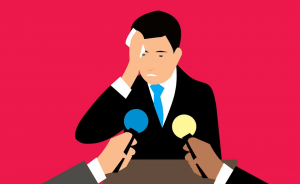2.1 What is Communication Apprehension?

“I have to do what?”
On the first day of history class, you see the syllabus and see that a significant percentage of your overall grade in the course will be determined by a ten-minute oral presentation that each student must give in front of the class. The presentation, due in eight weeks, will be based on an original research project.
After a very positive job interview, you receive an email asking you to return for a second interview, prepared to answer several questions in front of a panel of senior managers. The questions are contained in an attachment. “Please be ready to stand in the front of the room to answer,” the email reads. “See you next week!”
You will be having dinner Saturday to meet your fiancé’s family. Then, just days from the dinner, your fiancé tells you that her father, a former Marine and retired police officer, will want to talk about politics and current events, and will likely judge what sort of person you are based on how well you defend your ideas.
Each of these scenarios might provoke one of the most common fears in our society: public speaking anxiety (PSA) or glossophobia. PSA is “a situation specific social anxiety” arising “from the real or anticipated enactment of an oral presentation” (Bodie 2010). If you experience PSA, you are not alone: approximately a quarter of all people report having this fear. (Drevitch, 2017). However, overcoming PSA is important if you are to grow personally and professionally. PSA can “prevent you from taking risks to share your ideas, to speak about your work, and to present your solutions to problems that affect many people” (Drevitch, 2017). Even mild PSA can affect your self-esteem (Adler, 1980), how you are perceived by others (Dwyer & Cruz, 1998), as well as success in school and in landing job interviews (Daly & Leth, 1976).
Effective public speaking is not simply about learning what to say, but about developing the confidence to say it. “Fear of public speaking is not so much related to the quality of a speech as it is to how the speaker feels, thinks, or acts when faced with speaking in public” (Drevitch, 2017). The most effective way to deal with PSA is to identify your own “brand” of this fear, then take specific steps to overcome this apprehension.
one of the most commonly reported social fears
a subset of social phobia, the fear of social situations

